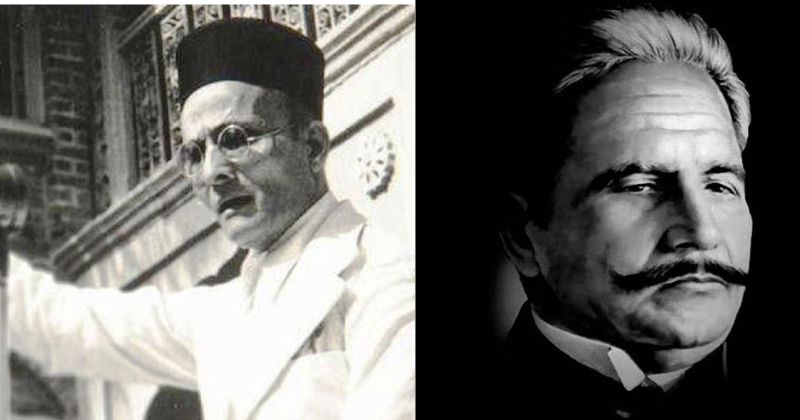Recently, the Academic Council of the University of Delhi decided to include Vinayak Damodar Savarkar’s contribution and philosophy in the political science syllabus and dropped Mohammad Iqbal’s philosophy. In this backdrop, many scholars, retired IPS officer BL Vohra and former IFS officer Bhaswati Mukherjee showed their support in an open letter on June 7, 2023. This open letter is signed by 123 retired government officials consisting of 59 retired bureaucrats, including 12 ambassadors and 64 retired Armed Forces officers.
According to the statement, “History, as written in texts and taught in any country, should truthfully reveal the facts and be interpreted impartially and without any bias”. But in India, since Independence, “Biased presentation of facts and distorted interpretation has adversely impacted the teaching of History and Political Science”.
This biased interpretation was made for political reasons by Congress and some left-leaning organisations for political reasons, they said. According to the former civil servants Vohra and Mukherjee, “Grave injustice was done to many historical personalities who laid down their lives for this country to help India break free from the clutches of British imperialism. As a result, there have been vociferous demands for rewriting of texts keeping in mind the need for a fair narration of the History of India’s national movement”.
They also welcomed the corrective measures, and action is being taken in some quarters, including by Delhi University’s Academic Council.
The former civil servants took the example of two personalities, Vinayak Damodar Savarkar and Poet Mohammad Iqbal. They stated, “It is particularly unfortunate that till the current inclusion of Savarkar’s contribution and philosophy in the Delhi University syllabus, universities under Congress-Leftist influence intentionally suppressed his contribution and ideas for our great Motherland. We are also of the firm opinion that historical figures that have been divisive and supported the division of Bharat need a ruthless critique in order to evaluate how Iqbal and his political views influenced the shaping of the future Indian subcontinent”.
In the letter, they laid out reasons why Savarkar was included, “Veer Savarkar, a distinguished freedom fighter, poet and political philosopher, left an important and indelible mark on India’s History. As a freedom fighter, he was put behind bars in ‘Kala Pani’ i.e. a British prison in Andaman and Nicobar Islands, for about a decade, out of which he was put in solitary confinement also for six months. He is called ‘The Father of Hindutva’ for his enunciation of Hindutva ideology in his remarkable piece of literature’ Hindutva: Who is a Hindu’. He propagated ‘Hindutva’ as a geopolitical concept, unifying diverse communities under a shared cultural and civilisational identity.
The letter further states, “Savarkar’s other book ‘The History of the War of Indian Independence’ was a great success but banned by the British colonialists. Simultaneously, he championed Dalit rights, working ardently towards caste eradication and promoting social equality. His vision of India as one nation was central to Savarkar’s ideology— ‘Akhand Bharat.’ Savarkar’s views on freedom, social reform, and national unity make him an enduring figure in Indian History. By studying Savarkar’s political ideologies, students will gain insight into the factors that shaped India’s nationalist movement and its subsequent trajectory”.
The letter also points out the necessity for the students to understand the impact of divisive historical figures and their contribution to partition. The letter then mentioned about the well – known Mohammad Iqbal, “He sowed the seeds of secession in the country. As President of the then Punjab Muslim League he championed the cause of a separate Muslim nation. Iqbal who wrote ‘सारेजहााँसेअछा हहन्दोस्तान हमारा…’ goes on to talk about Islamic Khilafat, recommended Islamic Ummah and changed ‘सारे जहााँ से अछा हिंदुस्तान हमारा (Our Country Hindustan is better than the entire world)…’ to ‘चीनो-ओ-अरब-हमारा, हिंदुस्तान हमारा, मुस्लिम हैं हम वतन है सारा जहााँ हमारा( China and Arabia are ours; India is ours, We are Muslims, the whole world is ours)'”.
The letter further talked about the role of Iqbal in partition, “Iqbal became radicalised, and as the President of the Muslim League, his ideas ran counter to democracy and Indian secularism. Many of Iqbal’s writings have been associated with the idea of a separate Muslim nation, ultimately leading to the tragedy of India’s partition. This concept of the Two-Nation Theory played a significant role in the partition of India, resulting in the trauma and suffering of millions of displaced in India’s East and West”.
Therefore, dropping him from the list of “Modern Indian Political Thought” is the correct step of the Academic Council of the University of Delhi, the letter states.



















Comments